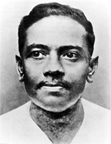Das, Jibanananda

Das, Jibanananda (1899-1954) poet and educationist. He was born on 17 February 1899 in Barisal town. His father Satyananda Das was a school teacher, social worker and founder-editor of the Brahmabadi. His mother Kusumkumari Das was a poet.
Jibanananda Das did his matriculation in 1915 from Brajamohan School, IA from Barisal B M College in 1917 and obtained his BA honours degree in English literature in 1919 and MA in 1921 from the Presidency College in Kolkata.
Jibanananda Das began his career in 1922 as professor of English in Calcutta City College. Later he worked as professor in Bagerhat Profulla Chandra College (1929), Ramjosh College in Delhi (1929-1930), Brajamohan College (1935-1947), Kharagpur College (1950-51), Barishal College (1952-53) and Howrah Girls College (1953-54). During this time he also worked as literary editor of the Swaraj, and as member of the editorial board of the Dvandra an organ of the Samakalin Sahitya Kendra in Calcutta.
Jibanananda Das used to write poems while in his teens. His first poem Varsa Abahan was published in the Brahmabadi in 1919. His first essay was written in lucid Bangla in remembrance of late Kalimohan Das. In the first phase of his writing poems, he was influenced by satyendranath dutta, mohitlal majumder and kazi nazrul islam. Most of the poems of his book Jhara Palak represent the influence of their style. In his books Dhusar Pandulipi (1936), Banalata Sen (1942), Mahaprithivi (1944), Sat-ti Tarar Timir (1948), Bela Abela Kalbela (1980) and Ruposi Bangla (1984), he created a poetic style and language that helped him in giving a new genre in the trend of modern Bangla poetry. The delicate sensuousness of beauty, taste and touch has given his poems a unique distinctiveness.
Jibanananda belonged to the group of poets who tried to shake off rabindranath tagore's poetic influence. Inspired by western modernism and the intellectual outlook of the Bengali middle class, this group wrote about the realities of the urban present and of the lonely self even while they drew upon the rural traditions of Bengal. Although Jibanananda's early poems reveal some influences of Kazi Nazrul Islam, Satyendranath Dutta and Mohitlal Majumder, he shook off these influences to become a towering figure in Bangla poetry. Jibanananda shared Rabindranath's deep feeling for nature, eloquently describing the beauty of rural Bengal in Rupasi Bangla and earning the appellation of Rupasi Banglar Kavi (Poet of Beautiful Bengal). Unlike Rabindranath, however, he also portrayed distressed humanity as well as the depression, frustration, and loneliness of modern urban life in his poems. Introspection is also an important characteristic of his poetic genius. His poems merge a concern for the present and a sense of history. Many of his poems sound like prose, and greatly influenced subsequent poets.
Jibanananda Das has been called a poet of nature. His Dhusar Pandulipi represents the unique expression of his creative mind in which his poetic imagination has painted a superb picture of the environment around him letting nature assume a stature much bigger and more alive. It is through his own perception and creativity that he could come out of all the influences of his time. In the background of his poems there is a kind of distance and solitude that tells of an unknown environ away from this sky and this world in which the poet weaves fantasy. He is the creator of a world of fantasy in Bangla poetry where one can enter but cannot get out of it. At the core of his poetry there lies a pristine pain, life decays and changes, everything ending in death.
Jibanananda's poems of rural Bengal played an important role in the political and cultural perspective of Bangladesh. His poems inspired a pride in Bengali nationhood, especially in the 1960s and during the war of liberation in 1971.
Many of Jibanananda Das writings have been published posthumously. Some of the more well-known books are: Jibanananda Daser Shreshtha Kavita (1954), Jibananander Kabyasombhar (1985), Prokashito Aprokashito Kavita Samagra (1993), Jibanananda Samagra (1985-1998), Jibanananda Samagra Songjojan (1999); collection: Aloprithivi(1981), Hey Prem Tomarey Bhebe Bhebe (1998). Kavitar Kotha (1955), a collection of his essays on poetry writing, is a valuable book. Another of his valuable books is Samalochana Samagra (1983 and 1986). An autobiographical essay Keno Likhi was published in 1944.
Two of Jibanananda Das'; well-known novels are Malyaban (1973) and Sutirtha (1977). The themes of these novels were unique and their writing style was special. His short stories were edited by others and published first as Jibanananda Daser Galpa (1972) and later as Jibanananda Daser Sreshtha Galpa (1989). Between 1985 and 1998 Jibanananda Samagra was edited by Debesh Roy and published in 12 volumes in Calcutta by Pratikshan Publications. Banalata Sen received an award (1953) at the Nikhil Banga Rabindra Sahitya Sammelan (All Bengal Rabindra Literature Convention). Jibanananda Dasher Shrestha Kavita won the Sahitya Academy award in 1954. He died in a tram accident in Kolkata on 22 October, 1954 . [Begum Aktar Kamal]
